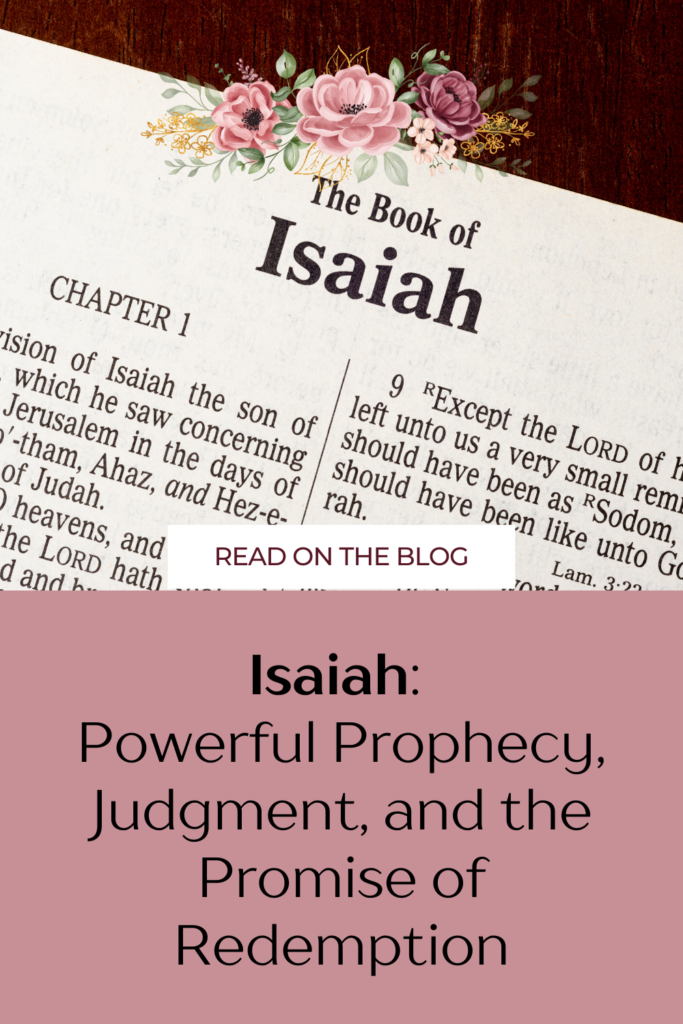The Book of Isaiah is one of the most important prophetic books in the Old Testament. Written by the prophet Isaiah, it spans over half a century, from around 740 to 700 B.C. It covers topics such as God’s judgment, sovereignty, and the hope of salvation. Isaiah vividly depicts both the holiness of God and the hope of redemption through the coming Messiah. In this post, we will explore Isaiah’s key themes, structure, significance, and how it points to Jesus Christ.
Background of Isaiah
Isaiah prophesied in Judah during the reigns of Uzziah, Jotham, Ahaz, and Hezekiah. God called him to speak to Israel during a time of spiritual decline and political instability. Though the message warned of judgment, Isaiah also delivered messages of hope, restoration, and the coming Savior. The book divides into two sections: chapters 1-39 focus on judgment, and chapters 40-66 focus on comfort and salvation.
Isaiah’s prophecies often use poetic and symbolic language, offering vivid imagery of God’s judgment and the glorious future of His people. Many of Isaiah’s prophecies are directly linked to the life, ministry, and mission of Jesus.
Where You Can See Jesus in Isaiah
In the Promise of the Messiah: Isaiah 9:6-7 speaks of a child born to rule on David’s throne, establishing peace and justice forever. This prophecy is fulfilled in Jesus, born in David’s line, the Prince of Peace (Luke 1:32-33, Matthew 1:1).
In the Suffering Servant: Isaiah 53 speaks of a servant who will be despised and rejected, bearing the sins of many. This prophecy points to Jesus’ crucifixion, where He took on the world’s sins and suffered for our redemption (Matthew 27:27-31, 1 Peter 2:24).
In the Call to the Nations: Isaiah prophesied that the Messiah would bring salvation to the nations. Jesus fulfilled this during His ministry, extending salvation to all people. He also commanded His followers to make disciples of all nations (Matthew 28:19-20).
In the New Covenant: Isaiah speaks of a new covenant where God will forgive sins and write His law on people’s hearts (Isaiah 55:3, 59:21). Jesus fulfilled this with His death and resurrection, making forgiveness and a restored relationship with God possible (Luke 22:20, Hebrews 8:6-13).
How We Can Apply Isaiah to Our Lives Today
- Recognize God’s Holiness: Isaiah’s vision of God’s holiness (Isaiah 6) reminds us of God’s greatness. We should approach Him with reverence, acknowledging His holiness and striving to live in a way that honors Him.
- Repent and Turn to God: Like Israel, we are called to repentance when we fall short of God’s standards. Isaiah’s call to repentance is still relevant today, urging us to turn from sin and return to God.
- Look to Jesus as the Messiah: Isaiah’s prophecies point directly to Jesus, the promised Messiah. Through His life, death, and resurrection, He fulfilled God’s promises and brings salvation to all who believe.
- Embrace the Promise of Restoration: Even in trials, Isaiah reminds us that God plans our restoration. We can hold onto hope, knowing God works to redeem us, both in this life and the next.
- Share the Good News: Isaiah speaks of salvation for all nations. We are called to share the good news of Jesus with everyone, spreading His message to the ends of the earth.
Conclusion
The Book of Isaiah is a powerful testimony to God’s holiness, justice, and mercy. It speaks of judgment for sin but also of the hope of redemption through the coming Messiah. Isaiah directly points to Jesus, the Savior who came to bring salvation to all people. As we read Isaiah, we are reminded of God’s promises, His sovereign rule, and the ultimate hope we have in Christ. Like Isaiah, may we proclaim God’s goodness and live in anticipation of His fulfillment of all His promises.
Call to Action
How do the prophecies in Isaiah about the Messiah impact your view of Jesus? Reflect on the hope of restoration and salvation in Christ and share your thoughts in the comments below. Let’s discuss how we can live out God’s promises today.






